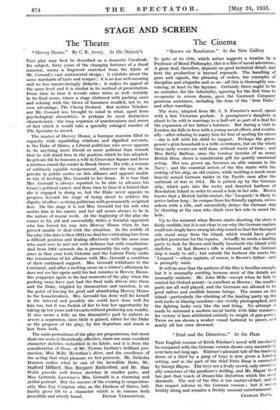STAGE AND SCREEN The Theatre
"Hervey House." By C. R. Avery. At His Majesty's
Tins play may best be described as a domestic Cavalcade. Its subject, forty years of the changing fortunes of a ducal mansion, seems a fragment snatched from the fabric of Mr. Coward's vast sentimental design ; it exhibits about the same standards of taste and temper ; it is no less well-meaning and no less unconvincingly didactic ; it makes its appeal at the same level and it is similar in its method of presentation. From time to time it reveals other debts as well—notably in its final scene, where a stage cluttered with packing cases and echoing with the blows of hammers recalled, not to its own advantage, The Cherry Orchard. But neither Tchekov nor Mr. Coward was brought, to mind in what, apart from psychological absurdities, is perhaps its most distinctive characteristic—the long sequence of anachronisms and errors of fact which it would take a specially enlarged number of The Spectator to record.
The master of Hervey House, a baroque mansion filled to capacity with squabbling relations and dignified servants, is the Duke of Shires, a Liberal politician who never appears to do anything more liberal or more political than remark that he will stand firm in the position which he has adopted. In private life he honours a wife in Grosvenor Square and loves a mistress round-the corner in Brook Street. His wife, a woman of sublimely equable temperament, whatever she may do in private in public smiles on this alliance and appears unable to tire of inviting Mrs. Gerould to her house. It is true that Mrs. Gerould is always reported to be able to advance his Grace's political career, and from time to time it is hinted that she is engaged in doing so, but the Duke never appears to progress beyond the stage of being about to achieve the dignity of office—a rising politician with permanently weighted feet. On the stage it is not Mrs. Gerould but his wife who assists him in his career, and her aid seems always to be in the nature of rescue work. At the beginning of the play she comes to his aid and successfully defies a Socialist opponent who has forced his way into Hervey House when he has proved unable to deal with the situation. In the middle of the play (the date is then 1901) we find her extricating him from a difficult position and dealing effectively with the same man who must now be met not with defiance but with conciliation. And from 1901 onwards she is presumably his only support, since in that year both Osborne and the Labour Party make the termination of his alliance with Mrs. Gerould a condition of their continued support. Mrs. Gerould withdraws to the Continent, and after a melting scene on a winter's afternoon he does not see her again until his last minutes in Hervey House. She reappears again in the last moments of the play when the packing cases have just had the final nails driven into them and the Duke, crippled by rheumatism and taxation, is on the point of leaving for good and abandoning Hervey House to the housebreakers. Mrs. Gerould has done well for herself in the interval and possibly she could have done well for him too, but it was foolish of her to lose her opportunity by taking up ten years and two acts without producing any results. It also seems a folly on the dramatist's part to enforce so severe a separation, since little is gained, either for the Duke or the progress of the play, by her departure and much is lost from both.
The main pretentions of the play are preposterous, but more than one scene is theatrically effective, there are some excellent character sketches embedded in its fabric, and it is from the consideration of these, of Mr. Tyrone Guthrie's brilliant pro- duction, Miss Molly McArthur's decor, and the excellence of the acting that what pleasure we feel proceeds. Mr. Nicholas Hannen makes what he can of the incredible Duke, Mr.
Stafford Hilliard, Miss Margaret Rutherford, and Mr. Alan
Webb provide well drawn sketches in smaller parts, and Miss Gertrude Lawrence's Mrs. Gerould is a charming and skilful portrait. But the success of the evening is unquestion- ably Miss Fay Compton who, as the Duchess of Shires, bril- liantly gives life to a character which is in essence both














































 Previous page
Previous page